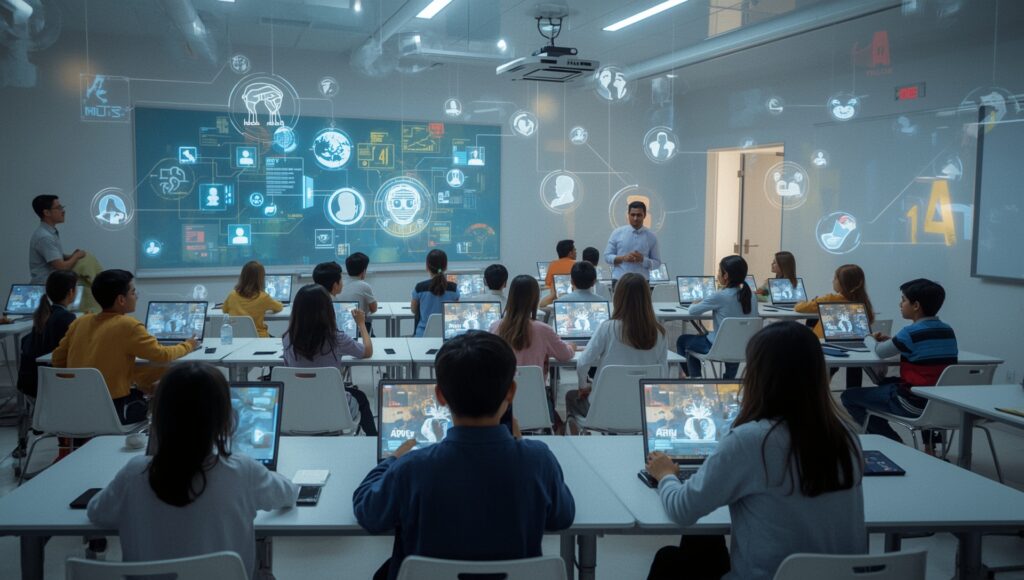
Imagine a world where every student receives an education tailored precisely to their needs, interests, and learning style. This isn’t a futuristic fantasy; it’s the promise of AI-driven personalized education. Traditional, one-size-fits-all education often leaves students behind, failing to address individual learning gaps and stifling their potential. AI offers a powerful solution, capable of analyzing vast amounts of data to create customized learning experiences that maximize student engagement and achievement. This article will explore how AI is transforming education, covering adaptive learning platforms, personalized curriculum, AI tutors, data privacy, equity, and the future of teaching, demonstrating its power to revolutionize learning for every student.
The Promise of AI: Transforming Education Through Personalization
AI’s ability to analyze student data and identify learning gaps is revolutionizing education. By understanding individual needs, AI can tailor educational content, providing personalized learning experiences that were previously impossible. The benefits of this approach are significant, including increased student engagement, improved learning outcomes, and reduced learning time. Instead of relying solely on standardized testing, AI enables continuous assessment, providing a more holistic and accurate picture of student progress. Personalized learning has been shown to significantly improve student outcomes . The shift towards personalized learning is not just a trend; it’s a fundamental change in how we approach education.
Adaptive Learning Platforms: AI’s Core Engine for Personalized Education

Adaptive learning platforms are at the heart of AI-driven personalized education. These platforms use AI algorithms to adjust the difficulty and pace of learning based on a student’s performance. As a student progresses, the platform adapts, providing more challenging material when they excel and offering additional support when they struggle. This ensures that students are always learning at their optimal level.
Crafting Personalized Curriculum: AI’s Role in Tailoring Content
AI plays a crucial role in creating personalized curriculum that aligns with individual student interests, learning styles, and career goals. By analyzing student data, AI can recommend relevant learning resources and activities, ensuring that students are learning content that is both engaging and relevant to their aspirations. This personalized approach fosters student agency and choice, empowering them to take ownership of their learning experiences. Research shows that personalized curriculum can significantly increase student motivation and achievement [3].
AI Tutors and Mentors: Providing Personalized Support and Guidance
AI-powered tutors and mentors are providing personalized support and guidance to students, answering questions, providing feedback, and offering encouragement. These AI tutors offer several advantages over traditional tutors, including availability, affordability, and objectivity. They can provide students with on-demand support, helping them to overcome challenges and achieve their learning goals. While some may worry about AI replacing human teachers, the reality is that AI tutors are designed to augment, not replace, the role of educators. These systems can provide personalized support, freeing up teachers to focus on more complex tasks.
Addressing the Challenges: Data Privacy, Equity, and Access in AI Education
The use of AI in education raises important ethical considerations, including data privacy, algorithmic bias, and equity of access. It is crucial to mitigate these risks through responsible AI development, robust data governance policies, and equitable resource allocation. Transparency and accountability are essential to ensure that AI is used ethically and effectively in education. Legal frameworks and ethical guidelines for data privacy in education are essential to protect student data [4]. Addressing algorithmic bias is also critical to ensure that AI systems are fair and equitable for all students.
The Future of Teaching: How AI Will Augment, Not Replace, Educators
AI will fundamentally change the role of teachers, freeing them from administrative tasks and allowing them to focus on personalized instruction, mentoring, and social-emotional learning. Teachers will need new skills and training to succeed in an AI-driven education system, including the ability to interpret data, personalize learning experiences, and foster critical thinking skills. The human connection and empathy that teachers provide will remain essential, even as AI plays a larger role in education. AI is already being used to support teachers in the classroom in various ways [5].
Case Studies: Real-World Examples of AI-Driven Personalized Education in Action
Several schools, districts, and educational programs have successfully implemented AI-driven personalized education. These case studies provide concrete evidence of the benefits of AI in education, highlighting the challenges they faced, the solutions they implemented, and the results they achieved. Data and statistics from these case studies demonstrate the impact of AI on student outcomes [6]. These real-world examples serve as a testament to the transformative potential of AI in education.
In conclusion, AI-driven personalized education has the potential to revolutionize learning for every student. By tailoring educational content to individual needs, interests, and learning styles, AI can increase student engagement, improve learning outcomes, and reduce learning time. While ethical considerations and challenges must be addressed, the benefits of AI in education are undeniable. Explore how AI can revolutionize your learning experience. Contact us to learn more about personalized education solutions!
